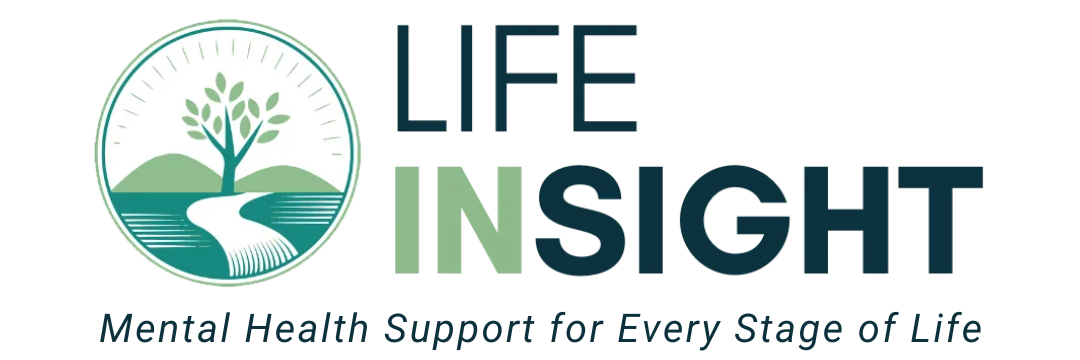Frequently Asked Questions
FAQs
What services do you offer?
We provide a range of professional services, including:
- Therapy – Individual and family therapy tailored to your needs.
- Psychological or Diagnostic Evaluations – Comprehensive assessments to support diagnosis and treatment planning.
- Social Skills/PEERS®/Group Therapy – Evidence-based group programs designed to improve social skills and peer interactions.
If you have any questions about our services or need guidance on what may be best for you, feel free to reach out!
Do you offer family or parenting support sessions?
Yes! Life InSight provides various support options, including:
- SPACE (Supportive Parenting for Anxious Childhood Emotions) – A structured program designed to help parents support children with anxiety-related challenges.
- PEERS® – An evidence-based social skills program for adolescents and young adults, with parent involvement.
- Parent Support – Guidance and strategies to help parents navigate challenges and support their child’s growth.
For more information on our family and parenting support services, feel free to contact us!
Do you provide psychological testing or assessments?
Yes! At Life InSight, we offer comprehensive neuropsychological, psychoeducational, and developmental assessments to help individuals understand learning, cognitive, emotional, and behavioral challenges. Our expert clinicians conduct in-depth evaluations, providing personalized insights and tailored recommendations to guide the next steps toward success.
What We Test For
Our assessments help identify a range of challenges, including:
- Learning Disabilities (Dyslexia, Dyscalculia, Dysgraphia)
- ADHD & Executive Functioning Challenges
- Autism Spectrum Disorder (ASD) Evaluations
- Cognitive & Intellectual Testing (IQ Testing, Giftedness Assessments)
- Emotional & Behavioral Assessments (Anxiety, Depression, OCD, Mood Disorders)
- Memory & Processing Speed Evaluations
Get the clarity you need—schedule a diagnostic assessment today!
Do you offer school-based support or coordination with teachers?
Yes! Navigating special education, IEPs, 504 plans, and academic accommodations can be overwhelming for parents. At Life InSight, we simplify the process by helping families understand their child’s rights, access the right services, and ensure they receive the necessary support to thrive.
How We Help:
- Expert Guidance on IEPs, 504 Plans & Intervention Services – Ensure your child gets the right academic accommodations.
- Comprehensive Program Reviews – Assess the effectiveness of your child’s educational plan.
- Advocacy & Expert Assessments – Support for parents and school districts to ensure compliance with educational standards.
Do you offer in-person or online therapy sessions?
Yes! We offer both in-person and online therapy services to accommodate your needs and preferences.
- In-Person Therapy – Meet with our experienced therapists in a comfortable, supportive setting.
- Online Therapy – Receive professional support from the comfort of your home through secure, HIPAA-compliant virtual sessions.
Whether you prefer face-to-face interaction or the convenience of remote therapy, we are here to support you. Contact us today to schedule a session!
What types of concerns do you specialize in treating?
At Life InSight, we provide expert care for a wide range of mental health concerns, offering personalized treatment plans tailored to each individual's needs.
Our specialties include:
ADHD & Disruptive Behavior Disorders
These conditions impact behavior and self-regulation. Attention-Deficit Hyperactivity Disorder (ADHD) is one of the most common neurodevelopmental disorders, often diagnosed in childhood and persisting into adulthood.
Anxiety Disorders
While anxiety is a natural response to stress, excessive or persistent worry that disrupts daily life may indicate an anxiety disorder.
Autism Spectrum Disorder (ASD)
ASD is a developmental condition that affects communication, social interactions, and behavior, often presenting as restricted interests and repetitive actions.
Chronic Health Disorders
Living with a chronic illness can impact mental and emotional well-being. We provide support for individuals and families navigating long-term health conditions.
Depression & Other Mood Disorders
Mood disorders, including depression, significantly affect emotional well-being. Symptoms may include persistent sadness, fatigue, and changes in sleep and appetite.
Obsessive-Compulsive Disorder (OCD)
OCD involves persistent, intrusive thoughts (obsessions) and repetitive behaviors or mental rituals (compulsions) performed to reduce distress.
Phobias
Phobias are intense, irrational fears of specific objects, situations, or activities that cause significant distress and avoidance behaviors.
Trauma & Grief
Trauma results from overwhelmingly distressing experiences, while grief is an emotional response to loss. Both can deeply impact emotional and psychological well-being.
How long does a therapy session last?
The average therapy session lasts 45 minutes, but session length may vary based on your individual needs. Your clinician will recommend the appropriate session duration for you. Typical session times include:
- 30-minute sessions – Ideal for brief check-ins or focused interventions.
- 45-minute sessions – Standard length for most therapy appointments.
- 60-minute sessions – Recommended for more in-depth discussions or complex cases.
Your therapist will work with you to determine the best session length for your treatment plan. Contact us today to schedule your appointment!
What age groups do you work with?
We provide therapy and testing services for individuals across all age groups, including:
- Young children (ages 2+)
- Adolescents & Teens
- Adults
Therapy services are available for individuals ages 2 through adulthood.
Testing services are also available for individuals ages 2 through adulthood.
Our team tailors treatment and assessments to meet the unique needs of each age group. Contact us today to learn more or schedule an appointment!
How does child therapy differ from adult therapy?
As children grow, their emotional and cognitive development evolves, which is why therapy for kids looks different from therapy for adults. The approach used depends on a child’s age, needs, and temperament. Two of the most widely used therapy methods for children include:
Play Therapy
- Commonly used for younger children
- Allows kids to express themselves through play, art, games, and creative activities
- Helps children process emotions when they lack the vocabulary to express their feelings directly
Cognitive Behavioral Therapy (CBT)
- Structured, research-backed therapy effective for anxiety, depression, and trauma
- Helps children recognize and change negative thought patterns
- Adapted for kids using interactive, playful, and developmentally appropriate techniques
Because children process emotions and thoughts differently than adults, our therapists use age-appropriate strategies to ensure effective treatment.
Contact us today to learn more about our child and adult therapy services!
Do you also provide therapy for adults, including parents?
Yes! We offer therapy for adults, including parents, to support their emotional well-being, personal growth, and family dynamics.
Our adult therapy services include:
- Individual Therapy – Support for anxiety, depression, stress, trauma, and more.
- Parent Coaching & Support – Guidance for managing parenting challenges and strengthening family relationships.
- Couples & Family Therapy – Helping families and partners improve communication and resolve conflicts.
Whether you're seeking support for yourself or guidance as a parent, we’re here to help. Contact us today to schedule a session!
How do you involve parents in their child’s therapy?
Parent involvement is a crucial part of a child’s therapy journey. We work collaboratively with parents to ensure children receive the support they need at home and in therapy. Our approach includes:
- Parent Consultations – Regular check-ins with the therapist to discuss progress, challenges, and strategies.
- Parent Coaching & Training – Guidance on how to reinforce therapy techniques at home.
- Collaborative Goal-Setting – Working together to establish and track treatment goals.
- Family Sessions (When Appropriate) – Involving parents in therapy to strengthen family communication and support.
We tailor the level of parental involvement based on the child’s age, needs, and therapeutic goals. Contact us to learn more about how we support families!
How do I know if my child or teen needs therapy?
If your child or teen has been experiencing any of the following, therapy may be beneficial:
- Persistent Anxiety or Worry – Excessive fear, nervousness, or stress that interferes with daily life.
- Frequent Mood Changes – Ongoing sadness, irritability, or emotional outbursts.
- Behavioral Challenges – Increased defiance, aggression, or withdrawal from family and friends.
- Academic Struggles – Difficulty focusing, declining grades, or school avoidance.
- Social Difficulties – Trouble making or keeping friends, social anxiety, or isolation.
- Changes in Sleep or Appetite – Sleeping too much or too little, changes in eating habits.
- Coping with Trauma or Loss – Struggling with a major life event, such as a divorce, loss, or major transition.
- Low Self-Esteem or Self-Harm – Feelings of worthlessness, self-harm behaviors, or talk of suicide.
Early intervention can make a significant difference. If you’re unsure whether therapy is right for your child, contact us for a consultation today!
Do you accept insurance or offer a sliding scale?
While Life InSight remains an out-of-network private group practice, we provide a superbill that clients can submit to their insurance for potential reimbursement. In addition, Life InSight is committed to helping ensure that mental health services are accessible to our community and offer a sliding scale based on individual needs.
Contact us for more information!
Can I submit therapy expenses for out-of-network reimbursement?
Yes! Life InSight provides a superbill at the end of each month and evaluation period, which clients can submit to their insurance for potential out-of-network reimbursement.
Common CPT Codes:
- Intake Session: 90791
- Individual Therapy: 90832 (30 min), 90834 (45 min), 90837 (60 min)
- Family Therapy: 90846 (without patient), 90847 (with patient)
- Group Therapy: 90849, 90853
- Testing & Evaluations: 96130-96139 (various psychological and neuropsychological assessments)
Before testing, check with your insurance provider about out-of-network benefits, deductibles, and any pre-authorization requirements. Life InSight can assist with necessary forms if required.
For more details, contact us today!


